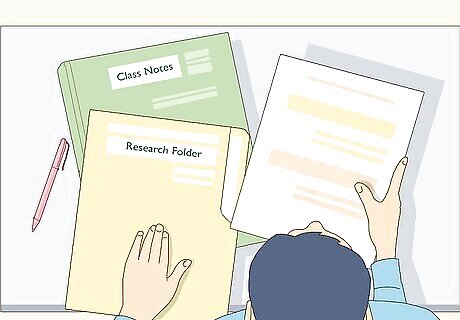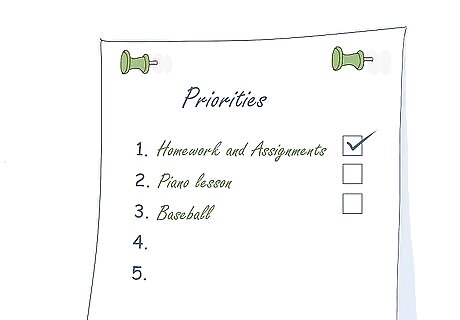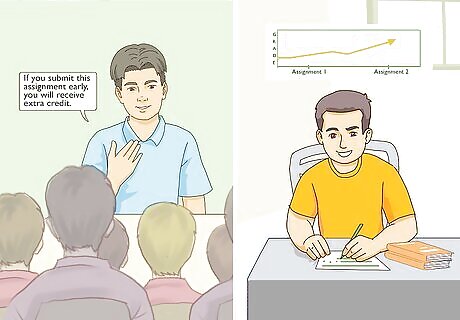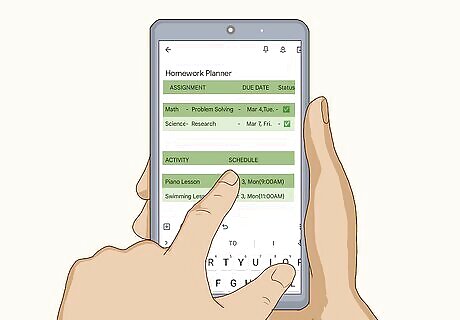
views
Take your notes by hand.

Writing activates more regions in your brain and can boost memory. If you can, use a pen or pencil and a notebook as your main way to take notes in class. It might take a little longer to write them out by hand, but it may actually help you remember the information. Some classes, especially in college, may require you to bring a laptop to use during the class. But if you don’t need one, try ditching it and taking notes by hand instead.
Focus on 1 task at a time.

Put away any distractions when you’re in class or studying. Studies show that when people aren’t distracted by their phones or email, they’re more productive and focused. Set your phone on silent and pack it away in your bag. If you’re using your computer in class, close any unrelated tabs and avoid the temptation to check your social media. Give your teacher your undivided attention. You’ll absorb more of the information and they’ll notice that you’re attentive and focused.
Organize all of your school materials.

Keep everything in its place so you can stay on top of your studies. Organize your assignments and class information by subject. Put all of your materials in binders, notebooks, or folders so they’re kept together. It’s also helpful to periodically reorganize and clean out your backpack or bag to keep everything in order and get rid of things you don’t need anymore. Organization is a simple way to make your life as a student much easier. If it helps, keep all of your folders and materials in a large binder so everything is kept together.
Create a workspace for online classes.

Help yourself stay focused. Whether you’re attending online school or taking virtual classes because of COVID-19, it’s important that you create an area that will help you focus and get your work done. Find a spot in your home that you can use and set up a desk with all of the supplies you’ll need. Put up some posters or decorations to make the space your own so you’re excited to use it for class. Make sure you have an outlet nearby and a solid internet connection so you can use your computer for class.
Participate in online forums for virtual classes.

Actively engage and discuss the material with your classmates. If you’re taking an online or virtual class, check out the forum or discussion board where students can post assignments and questions. Participate in the discussions and ask questions if you aren’t sure about something. The more you can engage with the class, the more you’ll learn and the more your teacher will notice. For instance, if you’re unsure about a homework assignment, you can usually post on the forum or discussion board and ask people for help. You can also use the discussion board to put together study groups. Try posting and asking people if they’d like to study as a group. Some online classes may require you to post and respond on the discussion board, so don’t lose points by not participating!
Go to every class.

Just by being there you’re already setting yourself up for success. It may seem like a no-brainer, but the truth is, going to class really is one of the most effective things you can do to be a good student. If you don’t miss class, you’ll stay up to speed on all of the new material and you’ll be able to ask questions about things that you aren’t sure of or that you find confusing. You’ll also get in the good graces of your teacher, which may come in handy if you need a deadline extension or help with an assignment. Try to get to class on time as well and sit somewhere where your teacher can see you. You don’t have to sit in the front row, but avoid hiding in the corner. The simple truth is that if you don’t show up for class, it’s much tougher to get good grades.
Do all of your homework and assignments.

They’ll help you stay on top of the subjects you’re studying. Homework isn’t just a boring thing that you have to do to get a good grade. It’s actually really useful for retaining the knowledge you’re learning in class. It can also help identify any areas where you’re confused or that you’re struggling with. Do all of your homework so you can be as knowledgeable about the subject matter as possible. Plus, if you’re a student who completes all of their assignments on time, if you ever need an extension or maybe even a small bump in your grade, your teacher may be more willing to help you out. Try to do your assignments as soon as you can. For instance, if a report is due by Monday and you've had three weeks to do it, don't wait until Sunday the night before to get started. Try to work on it daily for a while until you are finished with the report.
Take advantage of extra credit opportunities.

Give your grades a boost and get on your teacher’s good side. Check your class syllabus and keep your eyes peeled in class for any time your teacher mentions assignments you can do for extra credit. Sure, it may be work on top of what you’re already managing. But it’s totally worth the extra bump in your grade and the quality points you can earn with your teacher.
Create a schedule.

Keep all of your life activities organized so you don’t feel overwhelmed. Just because you’re focused on your studies doesn’t mean you can’t hang out with friends or have any fun. The key is to find a balance. Use a calendar or planner to make a schedule that includes all of your activities such as work, classes, study time, free time, exercise, or whatever else you want to do. Stay on top of your schedule and you won’t be as stressed out. Check your class syllabus and add big tests and projects to your calendar so you can keep track of them as well.
Study in time chunks.

Block out periods of time dedicated to focusing on studying. “Chunking” is the practice of focusing on specific things for set periods of time. Research suggests that 25-minute chunks are effective for studying and will help you retain the information and recall it later. Schedule times for you to focus specifically on studying. For example, rather than spending 1 day a week studying for 4 hours, break it down into 25-minute periods over a week. Chunking also makes studying feel more manageable and can keep you from feeling overwhelmed by the information.
Prepare for exams well ahead of time.

If you know your stuff, you won’t be as nervous come test day. Stick to a consistent study schedule a few weeks ahead of any upcoming tests or exams. Concentrate your studies on the most significant topics first, then work your way into the smaller details. Try to summarize or outline the information that you learn in class and in your textbooks in your own words to make sure you fully understand it. When it’s time for your test, you’ll be as prepared as you can be. If you have access to old exams, try studying them to get an idea of what the test looks like. Look for study groups you can join to go over the material with other people if that’s helpful for you.
Get tutoring if you need it.

Don’t be afraid to ask for help. Find out if your school offers tutoring services or look online for professional tutors you can hire to help you. Go over the material with your tutor and work with them to retain as much of it as possible. There’s nothing wrong with getting help from a tutor, and it can actually make a really big impact on your grades. Some schools offer tutoring programs that pair you with older students who are familiar with the material.
Get enough sleep each night.

It’ll sharpen your focus and help you retain information. Sleep is important for your physical and mental health, and it’s important that you get enough of it every night so you’re able to focus the next day. Sleep also plays a role in memory and concentration, so it’s really important if you want to be a good student. Try to get at least 7 hours of restful sleep each night.
Eat a healthy diet.

Give your body the fuel it needs to succeed. If you’re busy studying or you’re feeling stressed out, it’s tempting to reach for easy, tasty foods like junk food or processed snacks. But foods that are rich in sodium, sugar, and saturated fats can actually make your stress worse and may even affect how well you retain the information you study. Instead, stick to a healthy diet that includes lots of veggies and snack on foods that have been shown to improve memory such as yogurt, chocolate, and coffee.




















Comments
0 comment